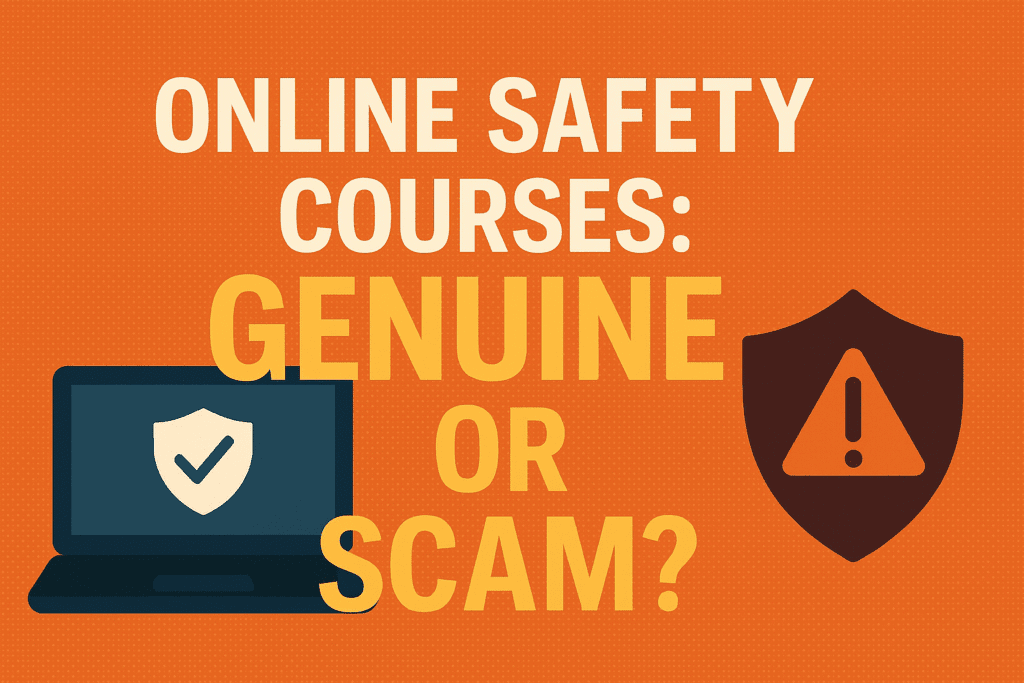
Online Safety Courses Genuine or Scam?
Let’s face it—online safety courses are everywhere. You see ads promising “OSHA certificate in 2 hours” or “Get NEBOSH certified today—no exam needed!” Sounds convenient, right? But here’s the big question: Are these online safety courses genuine or just a scam?
In this guide, we’re diving deep into the world of online safety training to help you figure out what’s real and what’s a red flag.
Why People Choose Online Safety Courses
Convenience and Flexibility
You can learn from your sofa, office, or even while commuting. No traveling. No classroom schedules. Online learning fits your life.
Cost-Effectiveness
Most online courses are cheaper than their offline counterparts. Some are even free. But remember—cheaper doesn’t always mean better.
Accessibility for Remote Workers
For those in remote areas or international job seekers, online safety certifications can be the only way to access proper training.
The Growing Market for Online Safety Certifications
With the rise in industrial safety regulations and the need for workplace compliance, safety roles are in demand worldwide. Online platforms are cashing in on this trend—some honestly, others not so much.
Common Types of Online Safety Courses
OSHA Online Courses
OSHA 10 and 30-hour courses are popular, especially in the U.S. Make sure the provider is OSHA-authorized.
NEBOSH E-Learning
Yes, NEBOSH does allow distance learning through approved partners. But beware—NEBOSH doesn’t allow “instant” certificates.
IOSH Managing Safely Online
IOSH has genuine e-learning options via registered providers.
Fire Safety, First Aid, and Hazard Training
Often offered by both accredited and non-accredited providers. Always check credentials.
Signs of a Genuine Online Safety Course
Accreditation from Recognized Bodies
This is a must. Check if the course is approved by OSHA, NEBOSH, IOSH, or local government bodies.
Verified Testimonials and Reviews
Real students leave real reviews. Look for video reviews, LinkedIn testimonials, and comments on trusted forums.
Transparent Contact and Support Info
No contact page? No customer service? That’s a red flag.
Professional Course Structure and Content
Real courses have learning objectives, modules, and evaluations—not just PDF downloads and “print-your-own certificate” scams.
Warning Signs of Scam Courses
No Accreditation or Unverifiable Claims
If you can’t find the course listed on the official certifying body’s website—run!
Unrealistically Low Pricing
If someone’s offering a NEBOSH course for $10, it’s likely fake.
No Contact Info or Hidden URLs
Scammers often use cloned or shady websites. Watch the domain name closely.
Instant Certification Without Assessment
No test, no project, just a certificate? That’s not how real learning works.
Real-Life Cases: People Duped by Fake Courses
Many jobseekers in the Middle East and Asia have reported being scammed by “training providers” who vanished after taking the fee. Some received fake certificates that cost them job offers.
How to Verify the Legitimacy of an Online Course
Check with Accrediting Bodies
Search directly on NEBOSH, OSHA, or IOSH websites.
Contact the Institution Directly
If in doubt, ask questions. Legit organizations respond professionally.
Ask for Demo Modules or Samples
Scam courses often can’t provide previews because they have no real content.
Research the Instructors and Content
LinkedIn profiles, YouTube lectures, or professional bios go a long way.
Best Practices Before Enrolling
- Compare 2–3 platforms
- Check refund policies
- Look for trial periods
- Read fine print
Are Free Online Safety Courses Legit?
When Free Doesn’t Mean Fake
Many NGOs and universities offer free basic safety courses. But they won’t usually be enough for job qualifications.
Examples of Reliable Free Sources
- Alison
- FutureLearn
- OpenWHO
What to Expect from a Genuine Online Course
- Step-by-step modules
- Interactive elements like quizzes and videos
- Final test or project
- Digital + printable certificates with unique verification codes
Role of Social Media in Promoting Fake Courses
Scammers often run targeted ads on Facebook, Instagram, and WhatsApp. They use testimonials, logos, and fake “limited-time” offers to create urgency.
Employer Perspective: Do Online Safety Certificates Matter?
Yes—but only if they’re real. Employers check:
- If the certificate is verifiable
- If the course is relevant
- If it’s from a known organization
Final Checklist Before Signing Up
- Accreditation
- Verified reviews
- Refund policy
- Clear syllabus
- Instructor profile
Conclusion
Online safety courses can be a career booster—but only if they’re genuine. Do your research, verify the platform, and never rush into paying. If something looks too good to be true—it probably is. Stay smart, stay safe, and keep learning!
OSHA and IOSH Officer Salary in Dubai
IOSH Certificate Verification: Original or Fake?
Check your OSHA Certificate is Original or Fake?
Legal Frameworks and International Standards in Health and Safety
Moral, Legal and Financial Reasons for Managing Health and Safety
FAQs
Q1: Are all free safety courses scams?
No, many legit platforms offer free introductory safety training, but they may not be sufficient for employment.
Q2: How do I know if a certificate is accepted by employers?
Check if the course is recognized by a global body like OSHA, NEBOSH, or IOSH, and ask your employer if they accept it.
Q3: Can I get a job with an online safety course certificate?
Yes, if it’s from a trusted source. Make sure the employer verifies the certification.
Q4: What is the safest platform to take an online OSHA course?
Look for OSHA-authorized training providers. The OSHA website lists them.
Q5: How do I report a fake online course?
You can report scams to your local consumer protection agency or directly to the accrediting body (e.g., NEBOSH or IOSH).